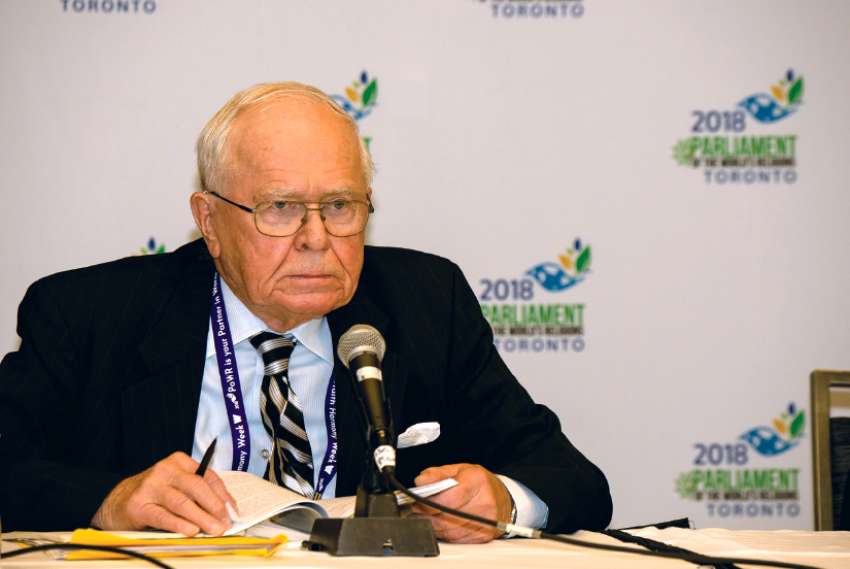Former Prime Minister Kim Campbell, retired senator General Romeo Dallaire and former Canadian ambassador and retired senator Douglas Roche took turns excoriating the state of political discourse and leadership at a press conference Nov. 6, the last full day of programming for the week-long gathering of nearly 800 religions and spiritualities at the Metro Toronto Convention Centre
But Roche, former Canadian Ambassador for Disarmament and disarmament advisor to the Holy See, took his critique one step further in demanding that his host revise its basic mandate document to include a specific endorsement of the Nuclear Weapons Ban Treaty passed at the United Nations in July of 2017.
“The Parliament of the World’s Religions is challenged to make it clear that there’s a moral choice based on the golden rule,” Roche said. “Do not do to others what you don’t want done to yourself.”
The Parliament, which traces its roots back to a gathering at the Chicago World’s Fair in 1893, convenes conventions on religion and global issues once every two years, but also studies moral issues from an interfaith perspective based on a document it calls “Toward a Global Ethic: An Initial Declaration of the Parliament of the World’s Religions.”
Though the document was amended to include a new section on climate change and environmental destruction in July this year, Roche wants it opened up again to strengthen its language on nuclear weapons.
He wants the organizers of the biennial conventions to “issue a call to all government, a call by all religions to all governments, to fulfill their moral and legal obligations to eliminate nuclear weapons from the world. This is not just a fanciful, side issue. This is a centre-piece of world politics today.”
“Armament is a mistaken path; disarmament is the commandment of the times. Let no one be deceived: There is no survival for humanity without global peace!” reads the “First Directive” — one of five directives appended to the Parliament’s basic statement on ethics.
That’s far too vague for Roche.
“It’s no longer good enough to say we want to abolish nuclear weapons,” he said. A truly moral stand has to include a commitment to practical plans for nuclear abolition.
Incoming chair of the Parliament of the World’s Religions board of trustees Audrey Kitagawa did not embrace Roche’s suggestion.
“We just concluded an extensive review of more than 18 months of the Global Ethic,” she told The Catholic Register in an e-mail after the close of this year’s Parliament.
As it stands, the Global Ethic is clearly opposed to nuclear weapons, she said.
“The Global Ethic is a living document, which should remain untouched, but additions could be made to it in the form of directives or some other form separate from the original text,” she said.
Roche urged Canada’s bishops to actively support Pope Francis’ Nov. 10, 2017 statement that even possessing nuclear arms “is to be firmly condemned” — a position that lines up with the UN treaty prohibiting nuclear arms, which the Vatican signed and ratified.
“If the churches say nothing then what they end up doing is condoning these great evils.”
A statement from the Parliament of the World’s Religions declaring nuclear arms possession should be illegal under international law would not be trivial or merely symbolic, Roche said. The voice of the world’s religions united on a moral issue is important, he said.
Policy and political debate that simply ignores ethics and religious values is taking the world down a dangerous path, said Campbell, Canada’s 19th prime minister.
“We are living in a world that desperately needs leadership,” said Campbell. “Religious communities play a role in setting the tone and giving permission for people to act.”
Dallaire warned of the dangers of secularism and political debates that never stray from narrow national and economic interests.
“There is no statesmanship in that debate,” he said.


